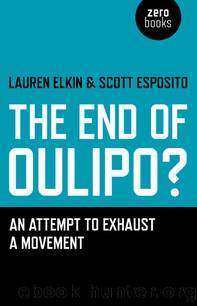The End of Oulipo? by Esposito Scott Elkin Lauren

Author:Esposito, Scott, Elkin, Lauren
Language: eng
Format: epub
ISBN: 9781780996561
Publisher: John Hunt Publishing
Published: 2012-12-02T16:00:00+00:00
Experiments
In the work of the Canadian poet and conceptual artist Christian Bök we see another response to Perec. Bök is one of those writers whose work is so clearly Oulipian that one is amazed to learn that he is not actually a member of the group; that he should be seems like such a no-brainer that the fact that he has not yet been co-opted is perhaps evidence of the movement’s increasing irrelevance. Bök’s first collection of poetry, Crystallography, uses the properties of crystals as a basis for the forms of the poems therein. His second book of poetry, Eunoia, a winner of the Griffin Prize and a bestseller, is a conscious response to the Oulipo. The book’s main conceit is to make poetry from univocal words (words containing just one vowel) aggregating them in each of its five sections, one for each vowel. The book also has exhaustive ambitions: as Bök explains at the end of Eunoia, part of the book’s system of constraints was to use 98 percent of the available words for each vowel. It reportedly took Bök seven years to write and required five readings of the dictionary.
Reading Bök’s statements on innovation in art and literature, he sounds precisely like the kind of person who might join a revolutionary literary movement. In an interview with Stephen Voice, he describes how, as a young poet, he eventually came to the idea of forsaking literature that had already been written for the “potential” variant: “I realized then that, by trying to write emotional anecdotes, I was striving to become the kind of poet that I ‘should be’ rather than the kind of poet that I ‘could be.’” In the same interview Bök also strikes a polemic tone, forcefully declaring that artistic innovation has been co-opted by capitalism:
Postmodern life has utterly recoded the avant-garde demand for radical newness. Innovation in art no longer differs from the kind of manufactured obsolescence that has come to justify advertisements for “improved” products; never- theless, we have to find a new way to contribute by gener- ating a “surprise” (a term that almost conforms to the cyber- netic definition of “information”). The future of poetry may no longer reside in the standard lyricism of emotional anecdotes, but in other exploratory procedures, some of which may seem entirely unpoetic, because they work, not by expressing subjective thoughts, but by exploiting unthinking machines, by colonizing unfamiliar lexicons or by simulating unliterary art forms.
Alas, the manufactured sense of innovation that Bök decries here sounds like the work of an Oulipian writer like Jouet, whose sense of experimentalism only stays within the realm of that which has characterized the literary for years. By contrast, Bök consistently forces himself to push his work into new, uncom- fortable terrain—precisely one of the principles that the Oulipo was founded on.
Part of what makes Bök’s engagement with the English language feel so new is his ability to detach the very stuff of language—letters, phonemes, even the way text prints on a page—away from the sounds and meanings that we’ve become so accustomed to associating with them.
Download
This site does not store any files on its server. We only index and link to content provided by other sites. Please contact the content providers to delete copyright contents if any and email us, we'll remove relevant links or contents immediately.
| African | Asian |
| Australian & Oceanian | Canadian |
| Caribbean & Latin American | European |
| Jewish | Middle Eastern |
| Russian | United States |
4 3 2 1: A Novel by Paul Auster(11047)
The handmaid's tale by Margaret Atwood(6852)
Giovanni's Room by James Baldwin(5877)
Big Magic: Creative Living Beyond Fear by Elizabeth Gilbert(4723)
Asking the Right Questions: A Guide to Critical Thinking by M. Neil Browne & Stuart M. Keeley(4574)
On Writing A Memoir of the Craft by Stephen King(4213)
Ego Is the Enemy by Ryan Holiday(3991)
Ken Follett - World without end by Ken Follett(3972)
The Body: A Guide for Occupants by Bill Bryson(3800)
Bluets by Maggie Nelson(3709)
Adulting by Kelly Williams Brown(3669)
Guilty Pleasures by Laurell K Hamilton(3586)
Eat That Frog! by Brian Tracy(3514)
White Noise - A Novel by Don DeLillo(3434)
The Poetry of Pablo Neruda by Pablo Neruda(3366)
Alive: The Story of the Andes Survivors by Piers Paul Read(3310)
The Bookshop by Penelope Fitzgerald(3225)
The Book of Joy by Dalai Lama(3217)
Fingerprints of the Gods by Graham Hancock(3212)
